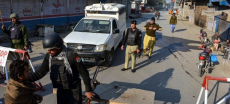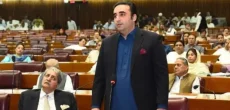[vc_row][vc_column][vc_column_text dp_text_size=”size-4″]As an apex court bench resumed hearing petitions against the trial of civilians in military courts in connection with their involvement in the May 9 violence, Attorney General for Pakistan (AGP) Mansoor Awan informed the Supreme Court on Friday that 102 people were in the army’s custody, none of whom were juveniles or women.
The appeals were considered by a seven-member supreme court bench led by Chief Justice of Pakistan Umar Ata Bandial and including Justices Ijazul Ahsan, Syed Mansoor Ali Shah, Munib Akhtar, Yayha Afridi, Sayyed Mazahar Ali Akbar Naqvi, and Ayesha Malik.
The AGP also informed the court that no journalists or lawyers were being held by the army. Awan further stated that one of the guys in army custody was unsure if he was 18 or under.
The AGP informed the court that tests were being undertaken to determine his age, and that if he was under the age of 18, he would be returned.
The CJP pointed out that the material was not attached to the application filed by the commanding officer at the anti-terrorism court to obtain civilians’ custody for trial in military courts.
Later, the judge issued a non-speaking order related to the military courts’ cases.
The judge observed that determining the conditions under which cases were brought to military courts was a simple method to deal with the matter.
He went on to say that no proof was mentioned in the application.
Justice Bandial stressed that the court would not consider the legality of the clauses in the Army Act that authorised civilian trials.
The chief justice stressed that advocates must not harass, and that both journalists and attorneys play important roles in society.
Also Read: The annual rate of inflation is 34.05%.
The CJP stated that the bench wanted to hear about the army’s internal mechanism for obtaining civilian custody.
The CJP inquired of the AGP about the policy regarding media and attorneys.
He went on to say that the court was considering the matter from the standpoint of civilian rights.
The Supreme Court instructed the AGP to investigate the policy of the caretaker administrations in Punjab and Khyber-Pakhtunkhwa towards journalists and lawyers.
He stated that certain members of the bench had misgivings about journalists and attorneys, despite the fact that society had faith in both of these professions.
Before the hearing began, the Punjab advocate general filed to the Supreme Court a report documenting the number of individuals detained or imprisoned in the aftermath of the May 9 riots, which erupted across the country following the arrest of PTI chairman and deposed Prime Minister Imran Khan in a corruption case.
According to the report, 2,258 persons were detained under the Maintenance of Public Order (MPO), with 21 being imprisoned.
It went on to say that 1,888 persons had been arrested in 51 terrorism cases, with 500 being released and 232 being released on bond. In addition, 4,119 persons were arrested in 247 additional cases, with 1,201 people released and 3,012 on bond.
Faisal Siddiqui, the lawyer representing members of civil society, arrived to the rostrum and stated that he would not argue that civilians could not be tried in military courts under the Official Secrets Acts, nor would he remark on the events of May 9.
He alleged that the Army Act was being “maliciously” applied.
He emphasised that those tried in anti-terrorism courts might submit appeals against their judgements.
However, he emphasised that people on trial in military courts could not appeal the verdicts.
Siddiqui stated that there were previous Supreme Court decisions concerning military courts.
He emphasised that a decision was issued against the military courts in 1998.
The counsel emphasised that the Army Act was not discussed in the ruling.
“Civil courts are rarely bypassed,” he continues.
Justice Ayesha enquired about the principles established in prior Supreme Court instances concerning the Army Act.
Siddiqui responded that previous decisions required a “clear distinction.”
He went on to say that he was not calling for a soft trial for the suspects, wondering what could be tougher than a hearing in an anti-terrorism court.
Military court trials, according to Justice Shah, were declared for national security reasons.
He went on to say that the statutes addressing military courts were for persons infringing on territory connected to state security.
In response to Thursday’s hearing about the pleas being heard first in the high courts, the lawyer stated that the case covered more than one province.
As a result, he contended that the subject could not fall under the jurisdiction of a single high court.
He insisted that the pleas could only be heard in the Supreme Court.
Justice Ayesha enquired as to what circumstances civilians may be tried under.
There was no record before the court, according to Justice Ayesha.
Siddiqui reacted by saying that even if the facts were missing, the issue was one of prejudice.
However, Justice Malik said that there was a mention of an insider link for the application of the Official Secrets Act.
Justice Ahsan inquired as to which offences were covered by the Official Secrets Act.
Justice Shah questioned how the army claimed these persons committed a crime.
“We are repeatedly asking you questions, but you are not answering them,” he informed the lawyer.
In response, Justice Malik stated that the court’s concern was how the venue of the trial was determined.
CJP Bandial stated that it was natural for the army to decide matters under the Official Secrets Act.
He went on to say that the army could ask an anti-terrorism court to extradite the accused.
The top judge maintained that the army’s motion in the current case lacked merit.
He further stated that the AGP will be questioned as to why the request was not supported by sound reasoning.
Justice Shah also questioned the counsel on the process for turning over a suspect to the army.
According to Siddiqui, there is no procedure in the Army Act for filing a complaint or filing a FIR.
The CJP suggested that an investigation into the use of the Official Secrets Act be launched.
According to Justice Bandial, the suspects’ remand order did not specify how or on what evidence they were turned over to the military.
The hearing resumed after a brief break, and Siddiqui emphasised that the details of how a trial would begin under the Army Act were provided in Army Rules, 1954.
“The process is mentioned in Rule 157, sub-section 13,” he noted.
He contended that there was no reason to seek the suspects’ surrender to the military.
Despite protests on May 9 and 10, he insisted that the suspects were sought on May 25.
He further claimed that while his client was not opposed to punishment for the accused, military courts were not the appropriate venue for civilian proceedings.
The third concern, according to the attorney, was whether a civilian could be court-martialed under the Army Act, noting that the statute was intended to maintain discipline inside the armed forces.
The hearing was then postponed until Friday prayers.
After the hearing was restarted, Hussain claimed that every citizen had the right to a fair trial and that this right could not be denied. He said that rulings for a court martial were likewise difficult to get.
Hussain said that the Army Act had not been written with civilians in mind.
Justice Shah inquired whether civilians were tried in military tribunals in other parts of the world, to which Hussain responded that each country has its own laws, and people may be tried in military courts in Britain, for example.
The lawyer questioned whether an officer could be subjected to fair proceedings in a military court following decisions made by the army’s high leadership.
He went on to say that no one could judge their own case.
Hussain claimed that the Supreme Court may issue an order pertaining to elements of the Army Act that affected civilians.
The hearing was then postponed until Monday.
Four major petitions were brought before the Supreme Court challenging civilian trials in military courts.
The PTI head moved one through his counsel, Hamid Khan. The second was filed by civil society members via Advocate Faisal Siddiqui, the third by veteran politician Chaudhry Aitzaz Ahsan, and the fourth by former Chief Justice of Pakistan Khawaja.
[/vc_column_text][/vc_column][/vc_row]











